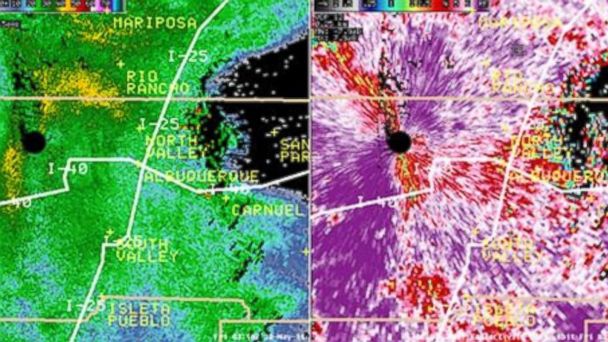Grasshopper Swarms So Dense They Show Up on Radar
The worst grasshopper infestation in 20 years has become so thick around Albuquerque, N.M., that the airborne bugs are showing up on weather radar, officials said today.
"Albuquerque has not seen these levels of grasshoppers since the early-mid 1990's," said John R. Garlisch, extension agent at Bernalillo County Cooperative Extension Service.
The National Weather Service said the air is so dense with the bugs that they appear on its radar like rain.

Grasshopper infestation is so dense around Albuquerque, N.M., they show up on weather radar like rain. National Weather Service
"We have actually been noticing the insects on radar since about Memorial Day," said NWS spokesman David Craft. "We have noticed the greatest impact on the radar during the evening, but they are noticeable at other times of the day, too."
"It is a nuisance to people because they fly into people's faces while walking, running, and biking. They are hopping into people's homes and garages, they splatter the windshield and car grill while driving, and they will eat people's plants," Garlisch said.
The swarm, the worst in two decades, is being blamed on the drought.
"There wasn't enough winter to kill the egg pots. Because of the dry winter the eggs survived, hence the outbreak of grasshoppers," David B. Richman, professor emeritus at the Department of Entomology, Plant Pathology, and Weed Science, New Mexico State University said.
Garlisch also said that the lack of forage and food on the open range lands is pushing the grasshoppers to seek greener pastures. "What better place than the Rio Grande with its riparian vegetation and an urban center where people keep green lush yards and gardens?" he said.
Bernalillo County Cooperative Extension Service told ABC News that they received many complaints about the grasshoppers.
"Some people are freaked out about them, others fear they will bring disease, and some folks want different agencies to spray to control them," said Garlisch.
While some people expect the state or the county to spray the grasshoppers, others protest any public spraying.
"Reality, spraying insecticide will be ineffective and will cause more harm than good," he said.
Katie Goetz, spokeswoman of the New Mexico Department of Agriculture, said that the department is aware of people's complaints. "The department determined that this is a homeowners' issue rather than an agricultural… It's localized in Bernalillo County," Goetz said.
The damage the grasshoppers may do includes eating the young tender leaves of flowers and vegetables. "We are encouraging gardeners to cover plants. Insecticide sprays are ineffective and not recommended. Grasshoppers are flying upwards of 3-5 miles. If an insecticide for the home gardener is used, it may kill a few grasshoppers, but more will be flying in. The more the homeowner sprays, this will negatively impact other insect species as well as the plant growth," said Garlisch.
Garlisch recommended waiting for this cycle to end. "Wait it out…As with everything this too shall pass," he said.